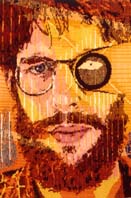Composer Profiles
David Mooney
 David Mooney
David Mooney
Listen to this show
 |
David Mooney
 to reach the composers' home page.
to reach the composers' home page.
In the early sixties one of the TV networks ran a special called "The Way Out Men." One of the further out men featured was Lucas Foss. The moment of the show that marked me forever and ultimately led, 30 years later, to my becoming a self-taught composer of computer music, occurred when the camera focused on Mr. Foss's score. There, on the staves, was written, "trash can lid." And underneath: fff. Not only was I enthralled by the music I was hearing, but here was evidence of an adult perpetrating legitimate acts of noise upon other adults!
I was hooked.
One of the employees at the local classical music record store thought it mighty curious that a 14 year old would walk in and ask if they had any recordings of music by Lucas Foss. He asked me how I had heard of it and would I like to hear some other interesting music. He became a mentor of sorts and opened my ears to electronic and computer music, musique concrete, and contemporary composers of works for traditional instruments.
I was addicted.
Unfortunately, years of studying clarinet and bassoon in public schools convinced me I have absolutely no talent as a musician, so a career in music was not in the cards. In college, a friend and I fantasized about creating an electronic music studio. After arriving at a ball park figure of $100,000 to do basic tape manipulation and electronic processing of the types that interested us, we laughed and said, "Well, that was fun." Two college kids without enough money for our next pizza weren't going to compete with the Columbia Princeton Electronic Music Center. And that, I assumed, was that.
More than twenty years later, twenty years continuing to follow and listen to new music, I realized that software and hardware for desktop computers were beginning to approach, even surpass, the capabilities of the major electronic music studios of the sixties and early seventies. Maybe it's possible to do this stuff after all!
My work follows the tradition of "tape music," music created in a studio and fixed on tape. Not many people use tape any more, so I call it "fixed music on disc." "Fixed" means that the work is finished when it leaves the studio. "Performance" means "played back," sometimes as straight playback and sometimes diffused over multiple speakers, but essentially unchanged from its fixed form. There is no interpretive layer (performers) between the music and you.
To reach the composer:
On-line: [email protected]
By telephone/fax:
By physical mail:


 David Mooney
David Mooney